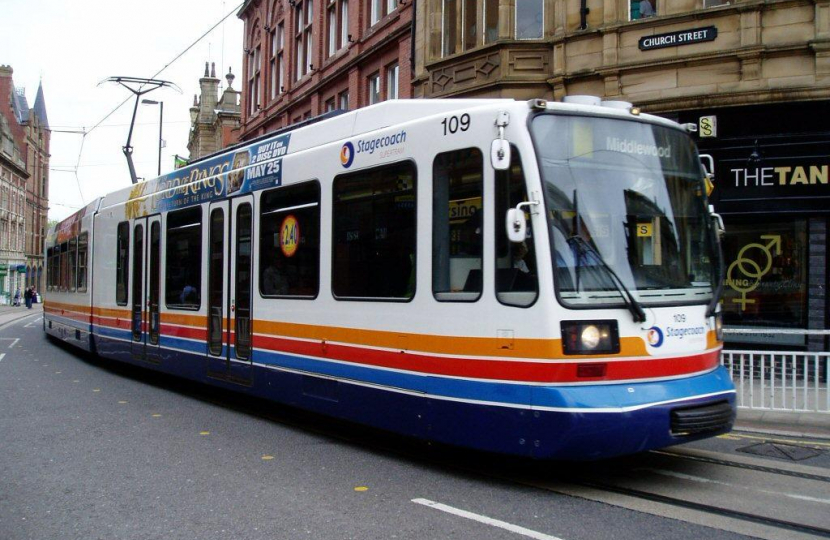
HISTORY OF SHEFFIELD SUPERTRAMS
It is important to look back at history and make sure we don’t make the same mistakes again. Last time Sheffield took the Supertrams on they lost money hand over fist.
Taxpayers money of £241m was spent setting up these trams. They couldn’t be made to pay. The 27 year franchise to run them was sold for £1m. That’s right. An overall loss to the taxpayer of £240m.
A loss to South Yorkshire of £115m. As reported by the Yorkshire Post, we in Doncaster have been paying it back ever since over the past 27 years. https://www.yorkshirepost.co.uk/news/politics/oliver-coppard-seeking-am…
Now the franchise is up and the Labour South Yorkshire Mayor wants to have another go at it. The four Labour controlled councils in the county have agreed. Memories are short it would seem.
In the late 1990s, Doncaster council, along with Sheffield, Rotherham, and Barnsley Councils became jointly liable for a reported £115 million shortfall in funding for the Sheffield Supertram. The figure for Doncaster City Council’s direct liability is unknown as there was no Conservative MP then to establish this.
However 22% of £115m is £25.3m. That would be our share by population assuming the percentage was the same in 1996.
Construction costs and privatisation
Construction of the Supertram cost a total of around £240million. In a 1997 Commons debate the Government gave a breakdown of the costs. https://hansard.parliament.uk/Commons/1997-01-13/debates/d45d4c4e-c7df-…;
Most of the funding came from capital grants from central government given under Section 56 of the Transport Act 1968.
https://www.legislation.gov.uk/ukpga/1968/73/section/56
Part of the contribution to construction was a £80 million loan taken out by South Yorkshire Passenger Transport Executive (SYPTE), with the expectation that the loan would be paid back when the franchise to run the Supertram was sold into the private sector, post-construction.
SYPTE was comprised of the four local authorities in South Yorkshire: Sheffield, Rotherham, Barnsley and Doncaster. Earlier this year, SYPTE was formally dissolved and its functions shifted to the South Yorkshire Mayoral Combined Authority (SYMCA), following South Yorkshire’s devolution deal.
https://southyorkshire-ca.gov.uk/Explore_Historic_SYPTE
Low passenger numbers and sell-off
The early years of the tram saw passenger numbers about 45% lower than expected, and SYPTE was forced to sell the franchise to run the Supertram at a very low price, which was not nearly enough to cover SYPTE’s debts (See The Independent, “Sheffield Supertram falls victim to competition from cheap buses”, 9 June 1996).
https://www.independent.co.uk/news/sheffield-supertram-falls-victim-to-…
In 1998, the operation of the Supertram was franchised to Stagecoach, the bus operator for 27 years for a payment of just £1 million, with the ownership of the assets remaining with SYPTE (BBC News, “Losses 'jeopardising tram plans'”, 23 April 2004).
http://news.bbc.co.uk/2/hi/uk_news/3651587.stm
1998 Legal Case
SYPTE and its four constituent councils took the then-Labour Government to court in 1998 seeking a Judicial Review, claiming that the previous Conservative Government in the early 1990s had made commitments to cover all liabilities for the Supertram, not the councils.
The Local Government Chronicle reported that the four councils (Sheffield, Barnsley, Doncaster and Rotherham) were liable for £115 million. The councils estimated that South Yorkshire tax-payers would face increases of about £40 in their annual council tax bills for as many as 30 years (See Local Government Chronicle, “Councils call on Govt to honour Sheffield Tram Promise”, 14 January 1998).
https://www.lgcplus.com/archive/councils-call-on-govt-to-honour-sheffie…
The Local Government Chronicle quotes the councils’ lawyer, Richard Mawrey, as follows:
“It had always been Sheffield, Rotherham, Doncaster and Barnsley Councils' 'bottom line' during protracted negotiations with the Conservative government in the late 1980s that local tax-payers should not have to contribute a penny to the cost of the project, said Mr Mawrey.
As the Supertram benefited only Sheffield and its immediate environs, Rotherham, Barnsley and Doncaster Councils would have found it 'politically impossible' to back the scheme if there was any risk that their tax-payers might be left with a bill, he added.”
On 19 January 1998 the High Court dismissed the application by SYPTE for judicial review of the government's decision (Financial Times, “Yorkshire councils face Supertram costs”, 20 January 1998 – paywall link to story on Nexis).
As you may know, South Yorkshire Mayoral Combined Authority (SYMCA) voted last year for the Supertram to be brought back into public control from 2024, when Stagecoach’s contract ends.
https://www.bbc.com/news/uk-england-south-yorkshire-63305271
Lots of questions arise. Some of them are:
•Why does the Labour Mayor of South Yorkshire think it will be different this time round?
•How will this directly benefit Doncaster?
•Will Doncaster’s economy receive any benefit, how is that calculated and what is it?
•When will the profit and loss forecast be made public? Will it be made available to MPs if not the public?
•Will the Labour Mayor of South Yorkshire rule out raising a precept for the Supertrams?
•What is Doncaster’s financial liability potentially?
•What is the plan for sharing any losses?
The questions are numerous.
There has been no consultation. No public surveys. No public meetings. Colossal sums of money are involved and yet it is all being done at speed under the radar.
I intend to press for answers to these questions and will keep you informed.



